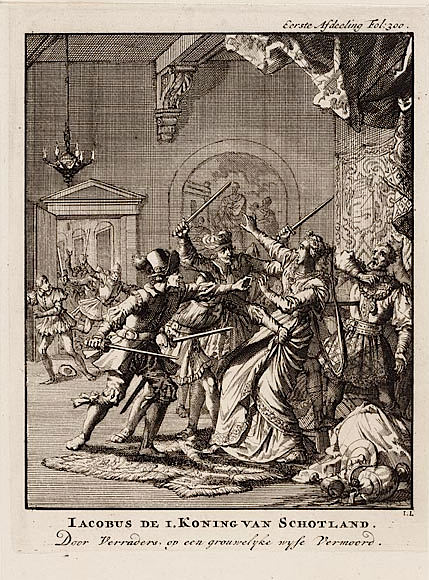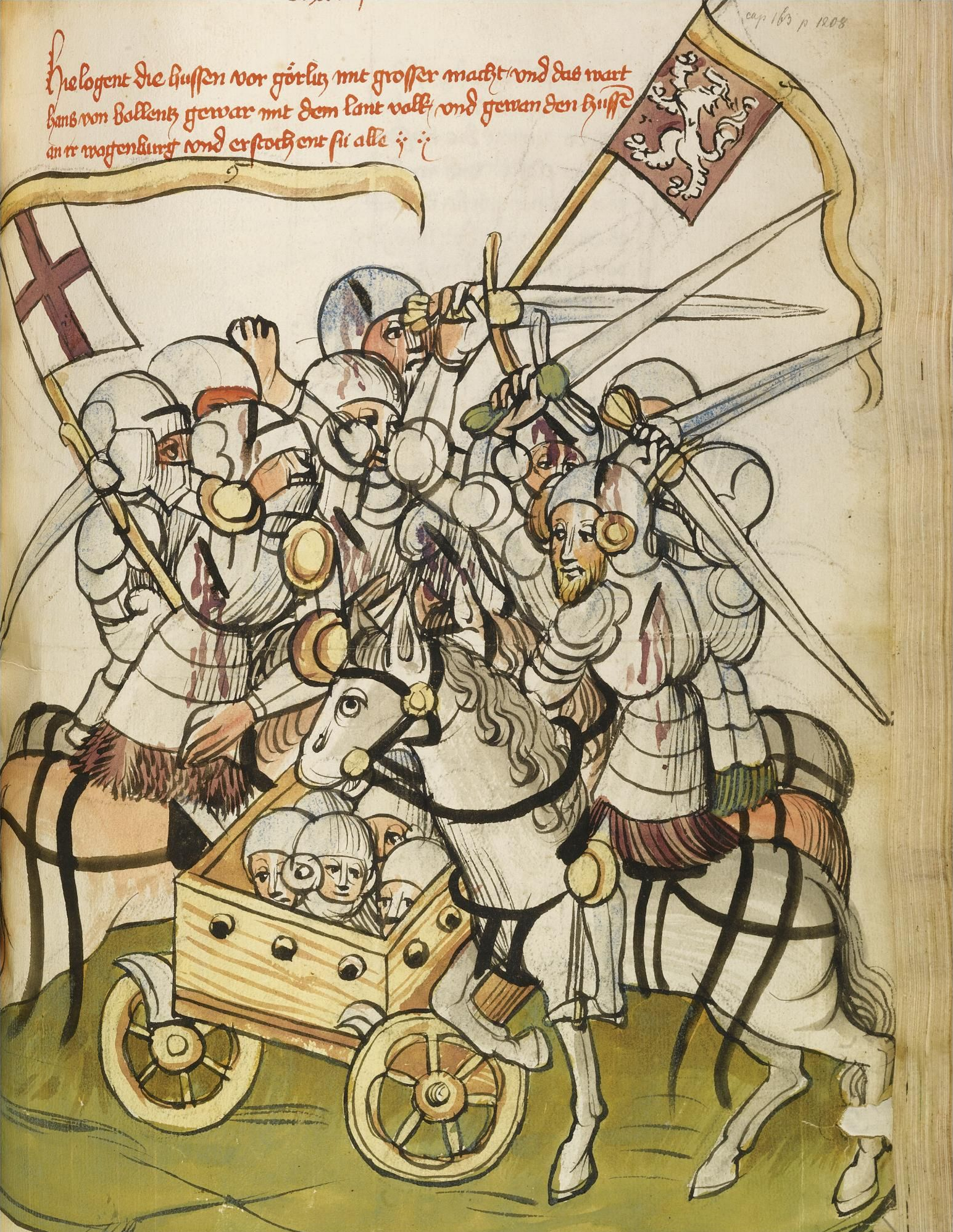|
Jan Roháč Of Dubá
Jan Roháč of Dubá (; died 9 September 1437) was a Bohemian Hussite general who originated in the Bohemian gentry. Life Following the death of Jan Žižka, he became Master of Orphans, a radical Hussite sect. He survived the Battle of Lipany The Battle of Lipany (), also called the Battle of Český Brod, was fought at Lipany 40 km east of Prague on 30 May 1434 and virtually ended the Hussite Wars. An army of moderate Hussite (or Calixtine) nobility and Catholics, called the ... in 1434 and, in 1437, he retreated with his last remaining disciples to his Sion Castle in what is now the Czech Republic. There he was besieged and after four months the castle defenses were successfully breached by the combined efforts of Bohemian troops under Hynek Ptáček and Hungarian troops led by Michael Ország. Roháč was hanged on Emperor Sigismund's order three days later in Prague. External links * Czech military leaders Czech revolutionaries Hussite people 1437 ... [...More Info...] [...Related Items...] OR: [Wikipedia] [Google] [Baidu] |
Sigismund, Holy Roman Emperor
Sigismund of Luxembourg (15 February 1368 – 9 December 1437) was Holy Roman Emperor from 1433 until his death in 1437. He was elected King of Germany (King of the Romans) in 1410, and was also King of Bohemia from 1419, as well as prince-elector of Margraviate of Brandenburg, Brandenburg (1378–1388 and 1411–1415). As the husband of Mary, Queen of Hungary, he was also King of Hungary and Croatia in union with Hungary, Croatia (''jure uxoris'') from 1387. He was the last male member of the House of Luxembourg. Sigismund was the son of Charles IV, Holy Roman Emperor and his fourth wife Elizabeth of Pomerania. He married Mary, Queen of Hungary in 1385 and was crowned King of Hungary soon after. He fought to restore and maintain authority to the throne. Mary died in 1395, leaving Sigismund the sole ruler of Kingdom of Hungary, Hungary. In 1396, Sigismund led the Battle of Nicopolis, Crusade of Nicopolis but was decisively defeated by the Ottoman Empire. Afterwards, he founded t ... [...More Info...] [...Related Items...] OR: [Wikipedia] [Google] [Baidu] |
Executed Czech People
Capital punishment, also known as the death penalty and formerly called judicial homicide, is the state-sanctioned killing of a person as punishment for actual or supposed misconduct. The sentence ordering that an offender be punished in such a manner is called a death sentence, and the act of carrying out the sentence is an execution. A prisoner who has been sentenced to death and awaits execution is ''condemned'' and is commonly referred to as being "on death row". Etymologically, the term ''capital'' (, derived via the Latin ' from ', "head") refers to execution by beheading, but executions are carried out by many methods, including hanging, shooting, lethal injection, stoning, electrocution, and gassing. Crimes that are punishable by death are known as ''capital crimes'', ''capital offences'', or ''capital felonies'', and vary depending on the jurisdiction, but commonly include serious crimes against a person, such as murder, assassination, mass murder, child murder, ... [...More Info...] [...Related Items...] OR: [Wikipedia] [Google] [Baidu] |
People Executed By The Holy Roman Empire
The term "the people" refers to the public or common mass of people of a polity. As such it is a concept of human rights law, international law as well as constitutional law, particularly used for claims of popular sovereignty. In contrast, a people is any plurality of persons considered as a whole. Used in politics and law, the term "a people" refers to the collective or community of an ethnic group or nation. Concepts Legal Chapter One, Article One of the Charter of the United Nations states that "peoples" have the right to self-determination. Though the mere status as peoples and the right to self-determination, as for example in the case of Indigenous peoples (''peoples'', as in all groups of indigenous people, not merely all indigenous persons as in ''indigenous people''), does not automatically provide for independent sovereignty and therefore secession. Indeed, judge Ivor Jennings identified the inherent problems in the right of "peoples" to self-determination, as i ... [...More Info...] [...Related Items...] OR: [Wikipedia] [Google] [Baidu] |
1437 Deaths
Year 1437 ( MCDXXXVII) was a common year starting on Tuesday of the Julian calendar. Events January–March * January 15– The Compacts of Basel are ratified by the Council of Basel in Switzerland, as the Roman Catholic Church ends its campaign against the Hussites. Among other things, the Church authorizes Hussite priests to administer sacramental wine to their congregations as part of the Communion during the Eucharist before Easter without declaring the same to be heresy, but stops short of allowing the Communion wafer. * January 17 – Battle of Hällaskogen, Sweden: Rebels from the cities of Arboga, Köping, and Örebro, led by Erik Puke, defeat the troops sent by King Karl VIII. Puke is captured a few weeks later, and beheaded on February 13. * January 21– The English Parliament, summoned in the name of King Henry VI on October 29, assembles at Westminster. The House of Commons elects the ailing John Tyrrell as its Speaker. * February 13&nd ... [...More Info...] [...Related Items...] OR: [Wikipedia] [Google] [Baidu] |
Hussite People
upright=1.2, Battle between Hussites (left) and Crusades#Campaigns against heretics and schismatics, Catholic crusaders in the 15th century upright=1.2, The Lands of the Bohemian Crown during the Hussite Wars. The movement began during the Prague.html" ;"title="Renaissance in Prague">Renaissance in Prague and quickly spread south and then through the rest of the Kingdom of Bohemia. Eventually, it expanded into the remaining domains of the Bohemian Crown as well. The Hussites (Czech: ''Husité'' or ''Kališníci'', "Chalice People"; Latin: ''Hussitae'') were a Czech Proto-Protestantism, proto-Protestant Christian movement influenced by both the Byzantine Rite and John Wycliffe that followed the teachings of reformer Jan Hus (fl. 1401–1415), a part of the Bohemian Reformation. The Czech lands had originally been Christianized by Byzantine Greek missionaries Saints Cyril and Methodius, who introduced the Byzantine Rite in the Old Church Slavonic liturgical language and the By ... [...More Info...] [...Related Items...] OR: [Wikipedia] [Google] [Baidu] |
Czech Revolutionaries
Czech may refer to: * Anything from or related to the Czech Republic, a country in Europe ** Czech language ** Czechs, the people of the area ** Czech culture ** Czech cuisine * One of three mythical brothers, Lech, Czech, and Rus *Czech (surname) *Czech, Łódź Voivodeship, Poland *Czechville, Wisconsin, unincorporated community, United States See also * Čech, a surname * Czech lands * Czechoslovakia * List of Czechs * * * Check (other) * Czechoslovak (other) * Czech Republic (other) * Czechia (other) Czechia is the official short form name of the Czech Republic. Czechia may also refer to: * Historical Czech lands *Czechoslovakia (1918–1993) *Czech Socialist Republic (1969–1990) *Protectorate of Bohemia and Moravia (1939–1945) See also ... {{disambiguation Language and nationality disambiguation pages ... [...More Info...] [...Related Items...] OR: [Wikipedia] [Google] [Baidu] |
Michael Ország
Michael Ország de Gút () was Palatine of the Kingdom of Hungary The Kingdom of Hungary was a monarchy in Central Europe that existed for nearly a millennium, from 1000 to 1946 and was a key part of the Habsburg monarchy from 1526-1918. The Principality of Hungary emerged as a Christian kingdom upon the Coro ... between 1458 and 1484. During Sigismund Reign he was Royal master of the Treasury. Notes Sources * * 1410s births 1484 deaths Gutkeled (genus) Palatines of Hungary Masters of the doorkeepers Royal treasurers (Kingdom of Hungary) Masters of the stewards Year of birth uncertain {{Hungary-bio-stub ... [...More Info...] [...Related Items...] OR: [Wikipedia] [Google] [Baidu] |
Bohemia
Bohemia ( ; ; ) is the westernmost and largest historical region of the Czech Republic. In a narrow, geographic sense, it roughly encompasses the territories of present-day Czechia that fall within the Elbe River's drainage basin, but historically it could also refer to a wider area consisting of the Lands of the Bohemian Crown ruled by the List of Bohemian monarchs, Bohemian kings, including Moravia and Czech Silesia, in which case the smaller region is referred to as Bohemia Proper as a means of distinction. Bohemia became a part of Great Moravia, and then an independent principality, which became a Kingdom of Bohemia, kingdom in the Holy Roman Empire. This subsequently became a part of the Habsburg monarchy and the Austrian Empire. After World War I and the establishment of an History of Czechoslovakia (1918–1938), independent Czechoslovak state, the whole of Bohemia became a part of Czechoslovakia, defying claims of the German-speaking inhabitants that regions with German ... [...More Info...] [...Related Items...] OR: [Wikipedia] [Google] [Baidu] |
Hynek Ptáček
Hynek is both a Czech masculine given name and a surname. It is a pet form of the name Henry. Notable people with the name include: Surname * J. Allen Hynek (1910–1986), American astronomer, professor, and ufologist * Joel Hynek, visual effects artist who has worked on over 30 films since 1980 Given name * Hynek Berka z Dubé, Bohemian knight and founder of the Berka z Dubé aristocracy line * Hynek Bílek (born 1981), Czech ice dancer * Hynek Bočan (born 1938), Czech film director and screenwriter * Hynek Čermák (born 1973), Czech actor * Hynek Fajmon (born 1968), Czech politician and Member of the European Parliament * Hynek Hromada (1935–2012), Czech sports shooter * Hynek Kmoníček (born 1962), Czech diplomat and politician * Hynek Krušina of Lichtenburg (1392–1454) Hussite commander and governor * Hynek Zohorna (born 1990), Czech ice hockey player * Karel Hynek Mácha Karel Hynek Mácha () (16 November 1810 – 5 November 1836) was a Czechs, Czech Romanticism, r ... [...More Info...] [...Related Items...] OR: [Wikipedia] [Google] [Baidu] |





